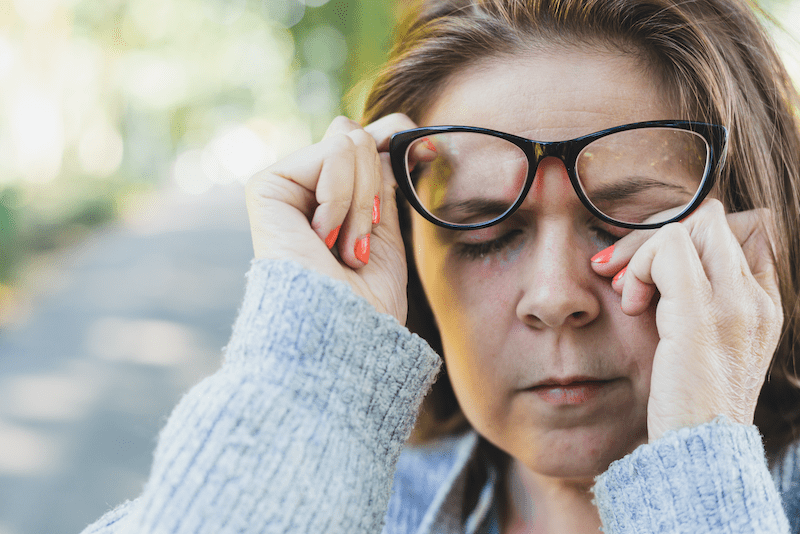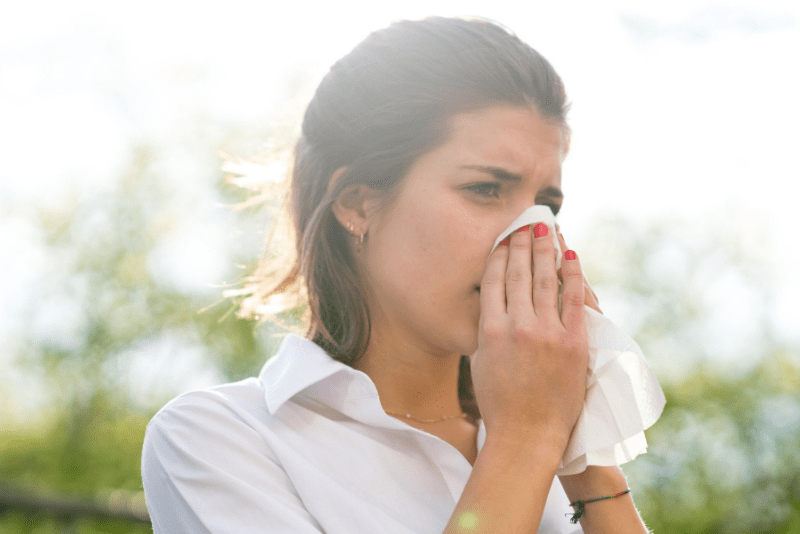Although most people associate allergies with sneezing and wheezing, eye allergies are another common form that many suffer from. Officially called allergic conjunctivitis, eye allergies are often coupled with other allergy symptoms related to the respiratory symptom. However, some individuals may suffer from only eye allergies, without any sneezing, coughing or difficulty breathing.
We’ll run through a few important key details related to eye allergies, including what they are, their main symptoms and causes, and how they can be treated.
What Are Eye Allergies?
Like other allergic reactions, eye allergies occur due to a misfiring of the immune system in response to some external stimuli. Although the symptoms are different when compared to other allergies, the causes are often the same. In many individuals, eye allergies occur alongside other forms of allergies and are brought on by the same irritants.
Common Symptoms of Eye Allergies
Eye allergies usually come in the form of red, itchy and watery eyes. In some cases, the symptoms may look like pink eye or an eye infection. However, pink eye caused by infection will usually be accompanied by a thicker discharge. When in doubt, it’s best to see a doctor.
Eye allergies can affect the eye itself as well as the skin around the eyelid, which can also become irritated, red and itchy. In most cases, you will be able to notice that your eye allergies are only present around certain irritants, such as pollen, smoke, animals or certain cosmetics. This is in contrast to bacterial or viral infections, which will not vary in this same way.
What Are The Most Common Eye Allergy Triggers?
The triggers for eye allergies are most often the same as other allergies. You may find that your eyes are sensitive to pollen, dust, pet dander, mold spores, smoke, cosmetic chemicals or other irritants. In most cases, an allergen that causes respiratory allergies will also cause eye allergies when it comes in contact with your eye.
Like other allergies, eye allergies will often be seasonal. If you experience eye allergy symptoms like redness and itchiness only part of the year, especially the spring and summer, you likely have eye allergies. Although it is relatively rare for people to only suffer from eye allergies while exhibiting no other symptoms, it is possible.
How Do I Find Out What I’m Allergic To?
The first step to finding relief from eye allergies is identifying the cause of your symptoms. Our board-certified allergists may suggest allergy testing so that we can target exactly what may be causing you to suffer. Allergy skin tests are accurate, quick and cause minimal to no pain. In fact, we can identify what you are allergic to within minutes!
What Are My Options for Treating Eye Allergies?
Once we have identified the cause of your allergic reaction, there are different types of treatment options for eye allergies that might be recommended do you. These fall into three main categories, each of which has further subclassifications. The main categories are eye drops, oral medications and immunotherapy.
How Can Eye Drops Help?
There are different forms of eye drops available to help you deal with your eye allergy symptoms. Artificial tears are a common, easily accessible form of eye drops that help by washing the allergens from your eye. They will add moisture and flush your eye area. Although they are helpful for many, sometimes they are not strong enough to keep your symptoms at bay.
Decongestant eye drops can also provide relief for many. These eye drops can also include antihistamines, but don’t always — make sure to check the label. Decongestant eye drops shouldn’t be used for more than a few days. If your symptoms persist, make sure to talk to your doctor.
There are other types of eye drops available as well, such as mast-cell stabilizers. These are a newer type of antihistamine eye drop, and most forms require a prescription, although there are also over-the-counter versions available.
If you’re experiencing eye allergies, you should keep in mind that while eye drops can bring relief to eye allergy symptoms, they don’t always target the root of the issue. A board-certified allergist will be able to provide a treatment plan that helps target the underlying cause of your eye allergy symptoms.
Oral Medications
Oral medications for eye allergies will usually be allergy-specific medications or more general antihistamines. These will be the same medications that you take for other types of allergies. You may find that because these medications take longer to take effect, they are best used as a preventative measure earlier in the day before you encounter your allergen.
Does Immunotherapy Work for Eye Allergies?
Immunotherapy (often known as allergy shots) is a more comprehensive treatment type that targets your immune system directly. It involves injecting small amounts of your allergen(s) to desensitize your immune system and usually results in a medication-free reduction in allergy symptoms.
Immunotherapy is the one form of treatment that can truly target the root of your allergy symptoms, including eye allergies. If your eye allergies are very severe, this is an ideal option to explore and is the closest thing to a “cure” that can be found. A board-certified allergist can help you hone in on exactly what your allergens are and provide an immunotherapy treatment plan tailored just for you.
How to Avoid Eye Allergens
For many people that suffer from allergies, avoiding them is one of the best options. This can be difficult or inconvenient in some cases but is something you should not overlook if your allergies are severe.
Staying indoors during allergy season is what avoidance usually brings to mind. However, you can also dust-proof your home and take other steps such as washing your hair and face and changing your clothes to remove external irritants when you come home. Ultimately, the level of allergen avoidance and individual needs depends on the severity of your allergies and the type of allergens you are allergic to.
Key Things to Remember About Eye Allergies
The main thing to remember if you are dealing with eye allergies is that they are the same as other forms of allergies. You should also keep in mind that there are several different treatment options that can be recommended by a board-certified allergist. Talking to a board-certified allergist is the best way to make sure you are on the right path.




